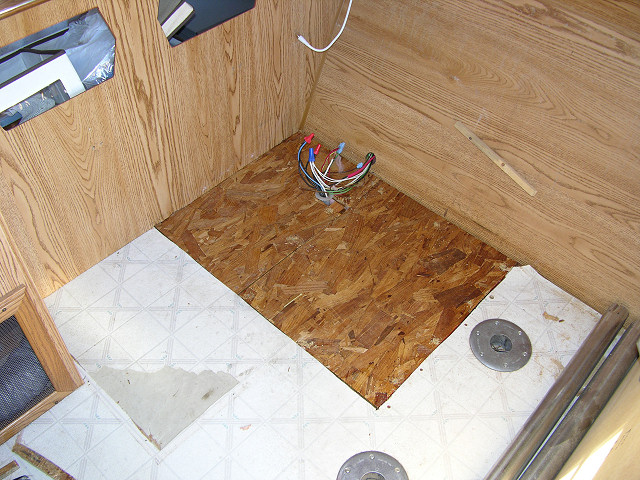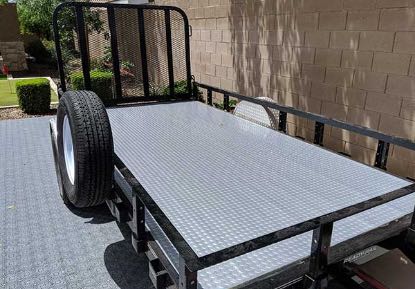Building a trailer is a big project, and after you’ve addressed the frame and the walls, you’re ready to start thinking about flooring. But what’s the best material for your trailer floor? Especially when it comes to wood, there are many factors to consider. As a seasoned DIYer, I’ve learned the hard way that choosing the wrong kind of wood can lead to weak spots, warping, and even damage. It’s important to do your research and understand the different types of wood that are best suited for a durable and reliable trailer floor.

Image: www.doityourselfrv.com
Choosing the right wood is important because it has to support the weight of everything you’ll be storing or transporting in your trailer. You want to avoid any chance of the floor sagging or failing under the weight of your load. The wrong choice of wood can compromise the whole trailer and cause you headaches down the line. Let’s take a look at some great options for trailer flooring.
Understanding Trailer Floor Needs: The Essentials
Trailer floors face unique challenges. They need to be resilient to impact, resistant to moisture and humidity, and strong enough to handle heavy loads. The right wood will help you avoid warping, cracking, and decay.
Factors to Consider When Choosing Wood
Here are some key factors to consider when choosing the best wood for your trailer floor:
- Durability: The wood should withstand wear and tear from heavy items, shifting loads, and even potential impacts.
- Moisture Resistance: Trailer floors are often exposed to moisture and humidity, so opting for a wood that resists rot and decay is crucial.
- Cost: Different wood species have varying costs, and it’s essential to find a balance between price and durability.
- Appearance: While not the primary concern, some wood species are more aesthetically appealing than others.
Top Wood Choices for a Strong and Durable Trailer Floor

Image: www.flooringinc.com
1. Pressure-Treated Pine
Although not the strongest option for heavy loads, pressure-treated pine is a popular choice due to its affordability and excellent resistance to moisture and rot. This type of pine is treated with preservatives to protect it from the elements and extend its lifespan, making it a good choice for outdoor applications. It’s also commonly used as an underlayment for other flooring materials.
Consider these factors:
- Pros: Affordable, moisture-resistant, readily available.
- Cons: Can warp if not properly dried, not the strongest wood, may require additional protection against scratches and wear.
2. Oak
Oak is a strong and durable hardwood that can handle heavy loads. Oak is also relatively easy to work with, making it a good option for DIYers. Oak can be a great option for trailer floors that will see a lot of wear and tear because of its strength and resistance to dents.
- Pros: Durable, strong, resists scratches and wear, adds a touch of elegance.
- Cons: More expensive than pine, can be heavy to work with, may require more maintenance.
3. Maple
Maple is another hardwood that’s surprisingly durable. It can be an excellent choice for trailer floors that will be exposed to moisture, as it resists rot and decay. Maple is also a good choice for trailer floors that will be used for transporting heavy items.
- Pros: Durable, scratch-resistant, aesthetically pleasing, water-resistant.
- Cons: Can be expensive, not always readily available, may need to be sealed for added protection.
4. Plywood
Plywood is a versatile option that comes in different grades. It’s made from layers of wood veneer glued together, offering strength and stability. Choose marine-grade plywood, as it’s specifically designed for applications where moisture resistance is essential, making it a great choice for trailer flooring.
- Pros: Durable, resistant to moisture (if marine-grade), affordable, easy to work with.
- Cons: Not as strong as hardwoods, can be susceptible to moisture damage if not sealed properly.
5. Engineered Wood Flooring
Engineered wood flooring is a relatively new product that is quickly gaining popularity. It’s made from layers of wood veneer glued together and then finished with a protective layer. It’s stable and durable, resisting moisture and warping, making it a good choice for trailer floors. It’s also easy to install, and many options are available to suit different aesthetics and budgets.
- Pros: Durable, stable, resistant to warping and moisture, easy to install.
- Cons: Can be more expensive than other options, less readily available than other woods.
Tips for Using Wood for your Trailer Floor
1. Proper Drying
Before installing wood flooring, make sure it is properly dried to avoid warping or cracking later on. It’s best to buy kiln-dried lumber for trailer floors, as this ensures that the wood is dried to an appropriate moisture level.
2. Protection and Maintenance
Once the wood is installed, you’ll want to seal it with a protective finish such as a stain, paint, or polyurethane. This will help to protect the wood from moisture, scratches, and wear. Use products designed specifically for marine applications for best results and choose an option that suits your aesthetic and the environment the trailer will be in. Depending on the type of wood and finish you used, you may need to reapply the protective coating periodically to ensure lasting durability.
FAQs about Trailer Floor Wood
Q: Does the trailer type matter when choosing wood?
Yes! The size and intended use of your trailer are important factors. For a small trailer for transporting lightweight items like gardening supplies, you may choose a less durable wood type. However, for larger trailers that will be used for transporting heavy items or used in harsh conditions, you’ll want to opt for a more robust wood option.
Q: Can I use composite flooring?
Composite options like vinyl or tile are increasingly popular, especially for trailers that will be exposed to moisture or heavy use. If you’re considering composite flooring, make sure it’s rated for heavy-duty use. These options are often more durable, easier to clean, and can withstand moisture better than wood.
Q: Can I install plywood over a standard trailer floor?
Adding plywood over an existing trailer floor can enhance durability and provide a smooth surface. Choose a marine-grade plywood specifically designed for moisture resistance and ensure proper installation and sealing for maximum effectiveness.
Best Wood To Use For Trailer Floor
Conclusion
Choosing the right wood for your trailer floor is a critical step that will influence the durability and longevity of your entire trailer project. Whether you opt for the classic appeal and strength of oak, the moisture resistance of maple, or a budget-friendly choice like pressure-treated pine, you’ve got several options to ensure a sturdy and reliable floor. Remember to prioritize durability, moisture resistance, and proper maintenance to ensure you build a trailer floor that can handle anything you throw its way.
Do you have any experience working with wood for trailer floors? Share your favorite choices or any tips you’ve learned along the way!



/GettyImages-173599369-58ad68f83df78c345b829dfc.jpg?w=740&resize=740,414&ssl=1)


